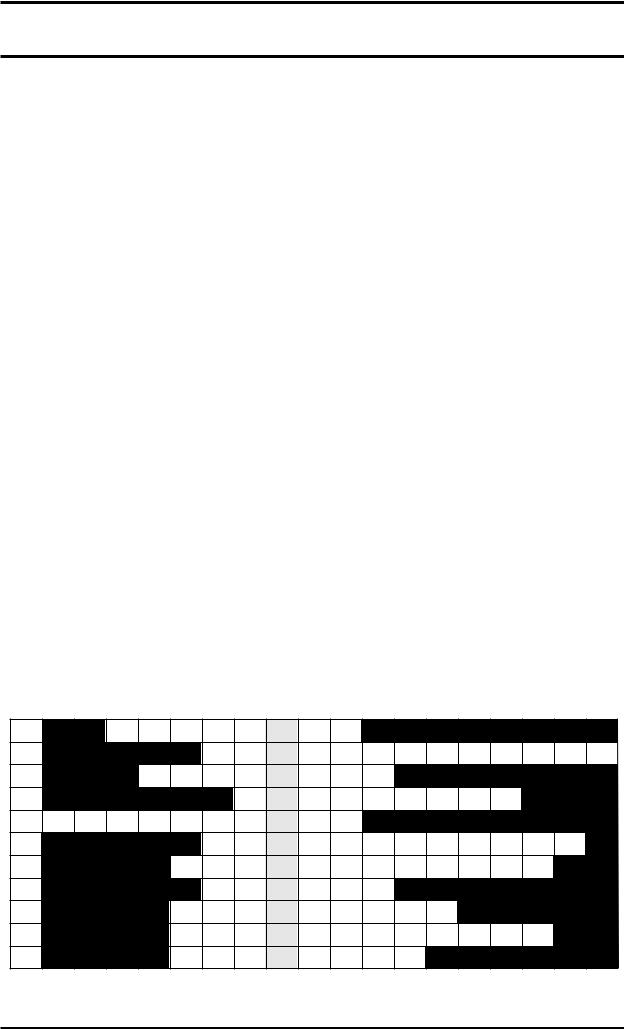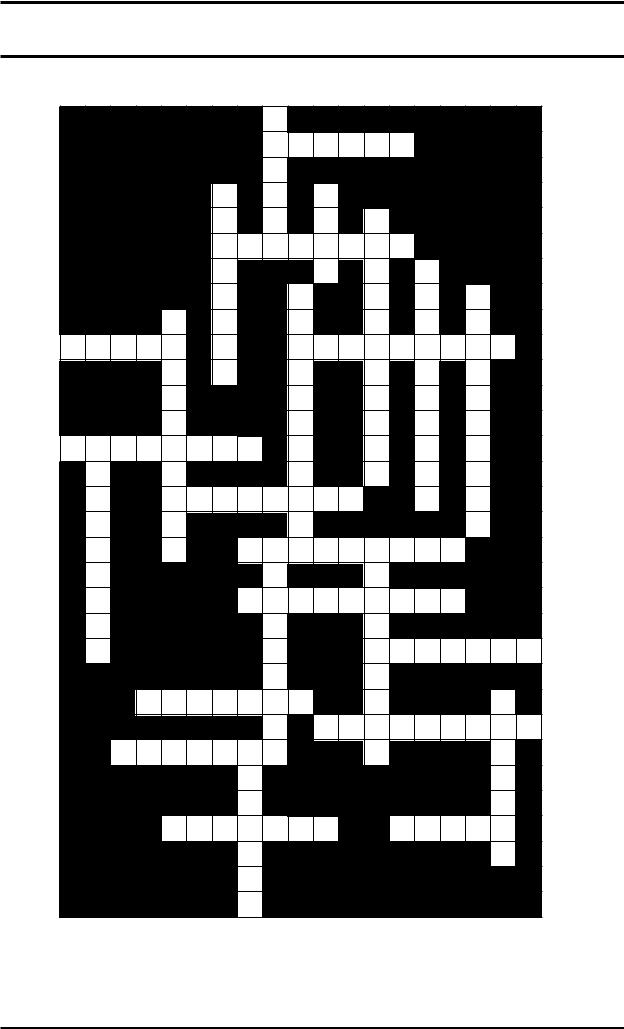
L.E.english_vocabulary_for_law
.pdf
LegalUnit 0000referencing
Contracts, formal letters and other legal documents frequently contain 'reference' words that are not often used in other areas of English. These words refer to time, place, result, etc, in connection with the documents they appear in.
Complete sentences 1 – 14 with appropriate words from the box. To help you, each sentence is followed by an explanation in italics of the function of the missing word.
aforementioned hereafter hereby herein |
hereinafter hereof |
hereto (x2) |
heretofore hereunder herewith thereafter |
therein thereinafter |
thereinbefore |
|
|
|
1.We are somewhat confused, as the contract we received named the company as The Sophos Partnership in the first paragraph, but __________ as Sophos Ltd. (listed or mentioned afterwards in the document)
2.Could you explain why the interest rate is quoted as 17% on the final page of the agreement you sent us, but as 15% __________. (listed or mentioned earlier in a document)
3.He was present when the exchange took place, and has been summoned as witness __________. (of this event / fact)
4.For more information, see the documents listed __________. (below this heading or phrase)
5.All parties are expected to comply with the conditions stated __________, unless a formal application is made to do otherwise. (in this document)
6.Final delivery of the merchandise is to be made no later than the dates listed __________. (relating or belonging to this document)
7.The copyright for this book will __________ be in the name of the author, Archibald Thrupp. (from this time on)
8.According to the schedule of payments attached __________, invoices must be submitted at the end of each month. (to this document)
9.You are advised to refer to the previous contract, and the terms and conditions cited __________. (in that document)
10.The accused is to report to his probationer twice a week for the first month, and __________ once a week for the next five months. (after that)
11.The parties __________ acting as trustees are to be consulted regularly. (previously, earlier or before now)
12.Thank you for the prompt despatch of our goods. Please find a cheque enclosed __________. (together with this letter or document)
13.This agreement is made on 1 April 2007 between Blueberry Press (__________ called the PUBLISHER), and Michael Halmsworth (__________ called the AUTHOR). (stated later in this document: the same word should be used to complete both gaps)
14.Mr Harrison has failed to comply with the terms set out in his contract, and we __________ revoke the contract. (as a result or in this way)
15.The __________ company was awarded the contract under certain conditions. (mentioned earlier)
46
For reference see Dictionary of Law 4th edition (A & C Black 0-7475-6636-4).

OnUnitthe 0000road
Complete the sentences and definitions below with words and expressions related to driving, and write your answers in the appropriate space in the table at the bottom of the page. The first and last letters of each word are already in the table. If you do this correctly, you will reveal a word in the shaded vertical strip that means 'a note on a driving licence to show that the holder has been convicted of a traffic offence'.
1.Driving a vehicle in such a way that it may cause damage to property or injure people, where the driver is unaware of causing a risk to other people, is called ________ driving.
2.The breaking of a rule or regulation is called a ________.
3.An offence committed when driving faster than the speed limit is called ________.
4.________ (2 words) is the offence of taking a vehicle without the owner's permission, and using it to drive about (usually in a dangerous manner).
5.The minimum type of insurance required when driving a motorised vehicle is called ________
(2 words) insurance.
6.A person who is ________ from driving has been legally banned from driving a motorised vehicle for a certain period of time.
7.If you are stopped by the police while driving because you have done something wrong, they may offer you a ________ (2 words), which means that they fine you a certain amount of money and give you automatic penalty points 'on the spot'.
8.________ is a verb which has a similar meaning to obey, and is often used in connection with obeying the rules of the road.
9.It is an offence to drive with ________ brakes, steering, tyres or eyesight (in other words, anything that doesn't work properly).
10.________ (2 words), also called driving with excess alcohol, is considered to be one of the more serious road traffic offences.
11.It is an offence not to wear a ________ when driving or riding in a car.
1 |
|
R |
|
|
S |
|
2 |
|
|
C |
|
|
N |
3 |
|
S |
|
|
|
G |
4 |
|
|
J |
Y |
R |
G |
5 |
T |
D |
P |
|
Y |
|
6 |
|
|
D |
|
|
D |
7 |
|
F |
|
D |
P |
Y |
8 |
|
|
C |
|
|
Y |
9 |
|
D |
|
|
|
E |
10 |
|
D |
|
K |
D |
G |
11 |
|
S |
|
|
|
T |
|
|
|
|
|
|
47 |
For reference see Dictionary of Law 4th edition (A & C Black 0-7475-6636-4). |
|
|
||||

PeopleUnit 0000in the law 1
This exercise tests your knowledge of the names we give to people who work in or for the legal system, or people who become involved in a legal process.
Complete each sentence with an appropriate word (the first and last letters have been given to you in each case), and use your answers to fill in the crossword on the next page.
Across
2.A l________r is a general term for any qualified member of the legal profession.
6.An a________y is somebody who is legally allowed to act on behalf of someone else.
11.A member of 4 down is called a j________r.
12.The j________y is the collective word for all judges in a country, as well as the court system in general.
13.An a________e is somebody who has the right to speak in open court as the representative of a party in a legal case.
15.A t________r is a man who has made a will.
16.A b________r is a member of the legal profession who can plead or argue a case in one of the higher courts of law.
19.An a________t is a person who appeals to a higher court in order to get it to change a decision or a sentence imposed by a lower court.
20.A c________t is somebody who is kept in prison as punishment for a crime.
21.The person who is elected by the other 11 members of 4 down is called the f________n.
23.A p________n officer supervises people who have committed something wrong but are not sent to prison, or people who have been released early from prison on certain conditions.
24.A s________t is someone whom the police believe has committed a crime.
26.A w________s is someone who sees something happen, or is present when it happens.
27.A j________e is an official who presides over a court and in civil cases decides which party is in the right.
Down
1.A c________t is a person who is represented by a 2 across.
3.A c________t is a person who takes legal action against someone in the civil courts.
4.A group of 12 citizens who are sworn to decide whether someone is guilty or not guilty on the basis of the evidence they hear in court is called a j________y.
5.Somebody who receives something under a will is called a b________y.
7.A m________e is an official (who is not a 2 across and who is usually unpaid) who tries cases in a lower court.
8.An a________r is somebody who decides who is right and what should be done in a disagreement or dispute.
9.A t________r is someone who has committed a civil wrong, or tort.
10.The person who brings criminal charges against someone in a court is called a p________r.
14.A d________t is someone who is sued in a civil case or somebody who is accused of a crime in a criminal case.
17.A person who applies for a court order is called an a________t.
18.A s________r is a 2 across who has passed the examinations of the Law Society and has a valid certificate to practise, who gives advice to members of public and acts for them in legal matters.
22.A c________r is a public official who investigates the cause of death or the reason for it, especially if it is sudden or unexpected.
25.C________l is the term for a 16 across acting for one of the parties in a legal action.
48
For reference see Dictionary of Law 4th edition (A & C Black 0-7475-6636-4).

Unit 0000
|
|
|
1 |
|
|
|
|
2 |
|
|
3 |
|
4 |
|
|
|
|
|
5 |
|
6 |
|
|
|
|
|
|
|
7 |
|
|
|
8 |
9 |
|
10 |
|
|
|
11 |
|
|
12 |
|
13 |
14 |
|
|
|
|
15 |
|
|
|
|
|
16 |
17 |
18 |
|
|
19 |
|
|
|
|
|
|
20 |
|
21 |
|
|
22 |
|
|
|
23 |
|
|
24 |
25 |
|
|
|
26 |
|
|
27 |
|
|
|
|
49 |
For reference see Dictionary of Law 4th edition (A & C Black 0-7475-6636-4). |
|
|||

PeopleUnit 0000in the law 2
Complete these paragraphs (which are taken from the A & C Black Dictionary of Law) with words or expressions from the box.
1. accused |
2. adoption 3. affiliation |
4. appointed 5. bench |
6. biased |
|||||||
7. called to the Bar |
8. challenged |
9. clerk |
10. commit |
11. criminal |
12. Crown Court |
|||||
13. electoral register |
14. eligible |
15. exclusively |
16. Inns of Court |
17. inquests |
||||||
18. jurors |
19. jury service |
20. lay |
21. libel |
22. |
Magistrates' Courts |
23. misconduct |
||||
24. on bail |
25. Parliament |
26. political |
27. practise |
28. pupillage |
29. recorders |
|||||
30. right of audience |
31. sentence |
32. solicitor |
33. stipendiary 34. trial 35. verdict |
|||||||
|
|
|
|
|
|
|
|
|
|
|
Barristers
In England and Wales, a barrister is a member of one of the __________ (= the four law societies in London to which lawyers are members); he or she has passed examinations and spent one year in __________ (= training) before being __________ (= being fully accepted to practise law). Barristers have the __________
in all courts in England and Wales: in other words, they have the right to speak, but they do not have that right __________.
Magistrates
Magistrates usually work in __________. These courts hear cases of petty crime, __________, __________, maintenance and violence in the home. The court can __________ someone for __________ or for
__________ in a __________. There are two main types of magistrates: __________ magistrates (qualified lawyers who usually sit alone); __________ magistrates (unqualified, who sit as a __________ of three and can only sit if there is a justices' __________ present to advise them).
Judges
In England, judges are __________ by the Lord Chancellor. The minimum requirement is that one should be a barrister or __________ of ten years' standing. The majority of judges are barristers, but they cannot
__________ as barristers. __________ are practising barristers who act as judges on a part-time basis. The appointment of judges is not a __________ appointment, and judges remain in office unless they are found guilty of gross __________. Judges cannot be Members of __________.
The jury
Juries are used in __________ cases, and in some civil actions, notably actions for __________. They are also used in some coroner's __________. The role of the jury is to use common sense to decide if the
__________ should be for or against the __________. Members of a jury (called __________) normally have no knowledge of the law and follow the explanations given to them by the judge. Anyone whose name appears on the __________ and who is between the ages of 18 and 70 is __________ for __________. Judges, magistrates, barristers and solicitors are not eligible for jury service, nor are priests, people who are
__________, and people suffering from mental illness. People who are excused jury service include members of the armed forces, Members of Parliament and doctors. Potential jurors can be __________ if one of the parties to the case thinks they are or may be __________.
50
For reference see Dictionary of Law 4th edition (A & C Black 0-7475-6636-4).

Privacy and data protectionUnit0000
A lot of people and organisations, ranging from shops and credit card companies to government agencies, have personal data ( = details) about us in their files and on their computers. Many people are worried that this data could be used against them or could 'fall into the wrong hands'. In Britain, the Data Protection Act sets out rules about how this data is processed and used by data controllers (= the people who hold details about us).
The following sentences summarise the main points of the Data Protection Act. However, each sentence contains between 1 and 4 spelling mistakes or wrong words. Identify and correct each one.
Surprisingly, there are no specific privacy laws in Britain, and people who feel they have been subjected to unwanted intrusion to their privacy often turn to the European Convention of Human Rights, and specifically Article 8, which concerns the right to respect for an individual's private life. In other cases, the United Nations Declaration of Human Rights contains a similar article (Article 12) which could be referred to. Infringements of privacy in Britain are sometimes referred to the European Court of Human Rights.
1.Data controllers should compliy with the rules of good information handling practise, known as the data protection principals.
2.Personal data should be proccesed fairly and lawfully, should be acurrate and relavant, and should be subject to appropriate secureity.
3.A person has the right to find out what infermation is held about them on computer and in some paper records. This is called the right of supject acess.
4.A person has the right to find out what credit agencys report about them and to be able to correct any mistakes in these reports.
5.A person has the right to prevent data being procesed if they think it is likely to cause them or anyone else unjustifried substantial damaging or substantial destress.
6.A person has the right to require the data controller not to use their personal detales to markit them with products, services or ideals.
7.A person has the right to know if a computer is used to process information about them in order to take a decisive that will effect them, and in some cases can present decisions being made about them which are based solely on automatic processing.
8.A person has the right to have unaccurate information about them ammended or destroyed.
9.A person who has suffered damage or distress as a result of a data controller failing to comply with the Data protection Act has the right to clam condensation from the data controller.
10.A person can issue court preceedings against a data controller if a sollution to any of the above points cannot be met by dealing directly with the data controller.
51
For reference see Dictionary of Law 4th edition (A & C Black 0-7475-6636-4).

PropertyUnit 0000
Exercise 1:
Test your knowledge with this quiz.
1.Rearrange the letters in bold to make a word: the absolute right to hold land or property for an unlimited time without paying rent is called rofedleh.
2.What is the difference between the answer to number 1 above, and the word leasehold?
3.True or false: the way in which a piece of land is held (as in 1 and 2 above) is called land tenure.
4.Choose the correct word in bold to complete this definition: a person or company which rents a house, flat or office in which to live or work is called a tender / tenure / tenement / tenant / tentacle.
5.In Britain, a person who arranges for the sale of property is called an estate agent. What is the American equivalent of this expression?
6.True or false: the transferring of property from one person to another is called conversion.
7.When you buy a house, why is it important to get the title deeds and keep them safe?
8.Imagine that you are buying a house with the help of a mortgage from the bank. The national interest rate looks likely to rise rapidly over the next year or so. Should you consider getting a fixed-rate mortgage or a variable-rate mortgage?
9.If you take out a mortgage to buy a house, and you use the house as security, the mortgage-lender might repossess (= take back) your house if you are unable to pay back the money. What is this called? Is it:
(a) disclosure (b) exposure (c) foreclosure
10.A married couple buy a house as joint tenants. Who actually owns the house? Is it:
(a) the husband (b) the wife (c) they both own it equally (d) it depends how much each person paid towards the house.
11.The new owner of a house discovers that there is a right of way in his garden. What does this mean?
(a)He can build another house in the garden if he wants.
(b)He must sell part of the garden after a fixed period of time.
(c)Other people can walk through his garden to get from one place to another.
(d)Farmers can let their cows and sheep use his garden.
12.A woman is buying a house. She makes a price offer, which is accepted by the seller. She is then gazumped. Would she be happy or unhappy about this?
13.Choose the correct word in bold to complete this definition: a liability such as a mortgage or charge which is often attached to a property or piece of land is called an enforcement / encumbrance / endowment / engrossment / encroachment.
14.In Britain, house buyers must pay tax on the documents that record the purchase of the house (if the house costs more than a certain amount). What do we call this tax? Is it:
(a) excise duty (b) customs duty (c) active duty (d) double duty (e) stamp duty
52
For reference see Dictionary of Law 4th edition (A & C Black 0-7475-6636-4).

Unit 0000
Exercise 2:
Imagine that you want to buy a property. Below are the different stages that you will normally (and ideally) go through. Complete the gaps with words and expressions from the box.
alterations |
appoint |
asking |
|
authority |
balance |
|
bound |
boundaries |
clauses |
|||
completion |
confirmation |
|
contract |
covenants |
|
deposit |
disclose |
|
disputes |
|||
fees |
offer |
ownership |
planning permission |
plans |
possession |
preservation |
||||||
Registry |
restrictions |
signing |
stamp |
structural |
|
survey |
surveyor |
|
title deed |
|||
|
|
|
|
|
|
|
|
|
|
|
|
|
1.You make an __________ on the __________ price (the price that the seller is asking for the house), which is accepted by the seller.
2.You __________ a solicitor to help you make your purchase.
3.You solicitor receives __________ of your accepted offer, and also any necessary details from the estate agent.
4.The seller's solicitor sends your solicitor a draft __________. This is checked to make sure there are no unusual __________.
5.At the same time, the seller's solicitor sends your solicitor the seller's __________. This is carefully checked for any __________ that might apply to __________ of the property. At the same time, the seller should make your solicitor aware of any problems with the property (for example, __________ with his / her neighbours, any approved or unapproved __________ that he / she has made to the property, relevant information on __________ adjoining other properties and public land, __________ or __________ orders that may restrict development of the property, whether you will need to get __________ before making changes to the property, etc).
6.If the contract is approved, copies of it are prepared for __________ by both you and the seller.
7.Before you do this, however, your solicitor should ask the local __________ (for example, the local town council) to __________ any information it has on __________ for the area around the property you are buying (for example, there may be plans to build an airport at the end of your back garden, or a motorway across your lawn at the front).
8.At the same time, you should ask for a __________ of the property by a chartered __________. He / she will tell you if there are any problems with the property (for example, rising damp, dry rot, unsound
__________ features, etc).
9.If you are happy with everything, you now sign the contract: you are now legally __________ to buy the property (you cannot pull out of the agreement, unless further checks by your solicitor produce unfavourable information that has been kept secret from you; for example, he / she may discover that the property details the seller has provided are not accurate).
10.Your solicitor arranges a __________ date with the seller's solicitor – this is the date when you will take official __________ of the property – and both you and the seller exchange contracts through your solicitors. Your title deeds are prepared.
11.You pay your solicitor his __________, the money for the property (assuming you have already paid a
__________ on the property, you will now need to pay the outstanding __________), the relevant
__________ duty and Land __________ fees.
12.You get your copy of the deeds and the key to the front door. Congratulations, and welcome to your new home!
53
For reference see Dictionary of Law 4th edition (A & C Black 0-7475-6636-4).

PunishmentsUnit 0000 and penalties
Check your knowledge of punishment and penalty vocabulary with this quiz.
1.Punish is the verb and punishment is the noun, but what is the adjective form of the word? What are the verb and adjective forms of the noun penalty?
2.Choose the most appropriate word in bold in this sentence:
'The court ordered the defendant to pay purgative / punishing / punitive / pugnacious damages to the claimant for the emotional distress he had caused.'
3.Rearrange the letters in bold to make words:
'After the jury returned a 'guilty' verdict on the defendant, the judge nopcnedoru tescenen on him.'
4.What do we call a punishment which is considered to be strong enough to stop someone from committing a crime? Is it:
(a) a detergent (b) a deterrent (c) a detriment (d) a determinant
5.Some countries still have corporal punishment and some still have capital punishment. What happens to the people who receive these punishments?
6.In Britain, a man is stopped by the police for driving at 45 in a 30mph zone. What will (probably) happen to him?
7.Next week, the same man is stopped again, and the police discover that he has been drinking alcohol and has over twice the allowed limit of alcohol in his body. What will probably happen to him now?
8.Rearrange the letters in bold to make words. The first and last letters of each word are in the correct place:
'If a defendant is found guilty of an offence in a court of law, he is ciecnotvd. If he is found not guilty, he is ateqciutd.'
9.What's the difference between a custodial sentence, a suspended sentence and probation?
10.A young man gets drunk and starts a fight in a bar, and as a result receives a banning order from a magistrate. What is he not allowed to do?
54
For reference see Dictionary of Law 4th edition (A & C Black 0-7475-6636-4).

Unit 0000
11.The same young man has a long history of harassing and intimidating his neighbours, stealing from shops and damaging property. He receives an ASBO and is ordered to sign an ABC. What do you think these abbreviations stand for?
12.What kind of person would be sent to a remand centre?
13.What is the maximum penalty allowed for crime in the United Kingdom?
14.Prison is a noun. What is the verb form of this word?
15.A judge sends someone to prison for a period of 5 years, and tells him / her that by law they cannot be released earlier. True or false: this is called a determinate sentence.
16.A woman is sentenced to 6 months in prison for theft, 4 months in prison for selling drugs, and 1 month in prison for refusing to pay her council tax. The judge tells her that these sentences will be concurrent, or run concurrently. What is the maximum length of time the woman will spend in prison?
17.Rearrange the letters in bold to make words:
The same woman has her sentence reduced because of dogo hevirobua and is released after only 4 months.
18.True or false: If someone receives a community service order, they have to go to prison.
19.A company signs a bond at the same time that is signs a contract with another company. What will happen to the company if they fail to comply with the terms of the contract?
20.Choose the correct word in bold in this sentence:
An injection / injunction / injury / injustice is a court order telling someone to stop doing something, or not to do something.
21.What do we call money that is paid from one party to another to cover the cost of damage, loss, injury or hardship? (Clue: it begins with c and ends with n)
22.Mr Smith goes to the Bahamas to start a new life. While he is there, an English court applies a freezing order to Mr Smith's assets. Would Mr Smith be happy or unhappy about this?
55
For reference see Dictionary of Law 4th edition (A & C Black 0-7475-6636-4).
